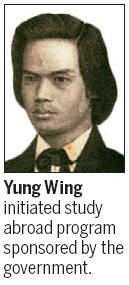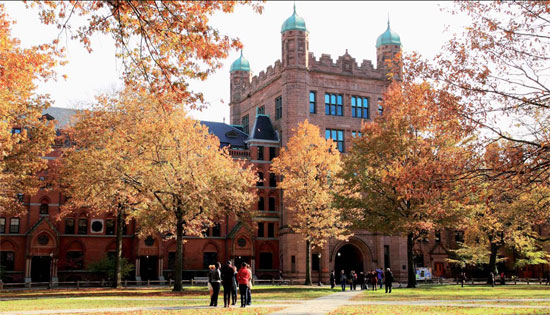Overseas ambitions
Updated: 2012-11-30 06:48
By Liu Jue (China Daily)
|
||||||||
|
Yale University, where Yung Wing was a trailblazer for those seeking knowledge and academic success outside China. Provided to China Daily |
More than 160 years ago a young man paved the way for Chinese studying abroad
Every September, Terminal 3 of Beijing Capital International Airport turns into Platform 9 3/4 of the Harry Potter series, with boys and girls running around pushing overloaded luggage carts, nodding and promising their parents to take good care of themselves over the next 10 months. But of course, they are just students going out of the country to study.
China has become the leading source of overseas students, and these young Chinese are bound for schools around the world. Last year alone, 339,700 Chinese students began studying abroad, according to the Ministry of Education, and an even larger number are applying this year.
Ever since 150 years ago when Yung Wing (容闳 róng hóng) first blazed a trail to the US, study abroad has been the trendy thing to do in various historical periods. For some time, only the best students were granted the opportunity, as well as the task, of repatriating knowledge. A sense of honor and responsibility came to be associated with studying abroad.
As Chairman Mao Zedong said in a speech to Chinese students in Moscow University in 1957: "The world is yours (the younger generation) and ours (the older generation), but eventually yours ... the future lies in your hands.
("世界是你们的,也是我们的,但是归根结底是你们的.希望寄托在你们身上." shì jiè shì nǐ men de, yě shì wǒ men de, dàn shì guī gēn jié dǐ shì nǐ men de.xī wàng jì tuō zài nǐ men shēn shàng.)
A look back at the time of the first Chinese student who obtained a Western degree gives an insight of how this trend started.
These days, Chinese students at Yale University are a dime a dozen, but in the mid-19th century, Yung Wing was the only Asian at what was then called Yale College. In a speech at Yale in 1878, Yung's friend Joseph Twichell described how Yung dressed in a long traditional robe on his first day, his hair braided according to Manchu style.

Later he took on Western fashions, and the portrait of him that still hangs at the university reveals that the man widely regarded as the first Chinese to receive a Western degree was a handsome young fellow.
Born a villager's son on a small island six kilometers from Macau in 1828, Yung was one of only two male students who attended a missionary school for girls. While his male peers were trained for the imperial examination, Yung grew up learning the language of the "red-haired people", a name given to foreigners during the Qing Dynasty (1616-1911).
When he turned 19, Yung bravely accepted an offer from his headmaster, an American missionary, to continue his study in the New World. This was a destination beyond the reach of most Chinese at the time, and little did Yung know that he would go all the way to study at Yale.
As to his academic life, in defiance of the common stereotype of Chinese students, Yung was a total failure in maths.
"In my sophomore year, from my utter aversion to mathematics, especially to differential and integral calculus, which I abhorred and detested ... I used to fizzle and flunk so often that I really thought I was going to be dropped from the class, or dismissed from college," Yung wrote in his memoir, My Life in China and America (《西学东渐记》 xī xué dōng jiàn jì). However, he was very good at composition, and won first place in school competitions two years in a row.
Yung always planned to return to China, which at the time was embroiled in civil war and border disputes with Russia, and was under constant pressure from colonial powers demanding greater trade privileges. Yung hoped the advanced ideas he had learned would help him solve some of these problems by modernizing China.
After graduating with a Bachelor of Arts degree, he returned home to work as an interpreter and a consultant, but his biggest achievement was to initiate the first study abroad program sponsored by the government, which sent more than 100 Chinese students to the US.
More than a century later, things changed greatly. In 1981, a policy allowed students to independently finance their education overseas, opening up new career paths for many students, and democratizing study abroad to include more than just an elite few selected by the government.
That same year, the TOEFL (Test of English as a Foreign Language, 托福 tuō fú) was introduced to China. Many students began to take the exam and submit their scores, along with other material, to apply for scholarships at overseas universities.
Ministry of Education statistics show that from the reform and opening-up to 2011, a total of 2.25 million students went overseas. The loosening of policies and management governing their activities meant they were able to pursue careers and lives in their host countries, an appealing prospect given the poor economic and living conditions in China.
"Study abroad" ultimately became a way of saying "move abroad" during the 1990s, illustrated by the fact that only 26 percent of these students returned to China when they completed their studies.
The number of overseas students has risen greatly since the late 1970s, as a booming economy, frugal spending habits and family planning policies have given middle-to-upper class Chinese families the means to afford sending their only child to study abroad. Disappointment with the domestic educational experience has made parents and students all the more willing to trade a Chinese diploma for a foreign one.
Today, Chinese students are found on every campus of the world's major universities, and their community is thriving. The number of those returning to China upon finishing their studies has also increased.
Past or present, studying abroad is an eye-opening experience for the individuals involved, and for the country as a whole.
Courtesy of The World of Chinese, www.theworldofchinese.com
The World of Chinese
(China Daily 11/30/2012 page19)

 Relief reaches isolated village
Relief reaches isolated village
 Rainfall poses new threats to quake-hit region
Rainfall poses new threats to quake-hit region
 Funerals begin for Boston bombing victims
Funerals begin for Boston bombing victims
 Quake takeaway from China's Air Force
Quake takeaway from China's Air Force
 Obama celebrates young inventors at science fair
Obama celebrates young inventors at science fair
 Earth Day marked around the world
Earth Day marked around the world
 Volunteer team helping students find sense of normalcy
Volunteer team helping students find sense of normalcy
 Ethnic groups quick to join rescue efforts
Ethnic groups quick to join rescue efforts
Most Viewed
Editor's Picks

|

|

|

|

|

|
Today's Top News
Chinese fleet drives out Japan's boats from Diaoyu
Health new priority for quake zone
Inspired by Guan, more Chinese pick up golf
Russia criticizes US reports on human rights
China, ROK criticize visits to shrine
Sino-US shared interests emphasized
China 'aims to share its dream with world'
Chinese president appoints 5 new ambassadors
US Weekly

|

|








